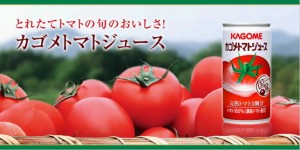Dan’s Slice of Culture 06.30.12
By Japanese cultural blogger Dan Moeller (Hiroshima-ken, 2009-11). Through blogging, staying active with Philly JETAA, and being married to his wife, Dan tries to stay connected to the Japanese world. Check out this piece and more of his thoughts at American Accent.
According to a recent study by Kagome and Asahi Group Holdings, drinking tomato juice will help you sober up faster (source). Apparently, the tomato juice helps to cleanse your liver by making it secrete more of the enzymes needed to break down alcohol.
The study included an experiment of people given about two shots of shochu (焼酎, a Japanese liquor similar to vodka). After the two shots of shochu, the control group was given a pint of water while the experimental group was given a pint of tomato juice. Those drinking the tomato juice sobered up an average of 50 minutes faster than those drinking water.
Kagome and Asahi agree that a tomato would most likely work the same way, although it was not studied.
This is great news considering Japan loses an estimated $11.5 billion every year to hangovers according to a recent survey of close to 3,000 people (source). I wonder if Japanese government and businesses will take this news seriously and actively engage in promoting tomatoes after enkai. I could picture the market for トマトパ ワー (Tomato Power) After-Party Shooters. (Japan is often wont to either fully embrace something or just let it fall by the wayside, e.g., influenza masks; the insurance hikes on those with large waistlines; or even baseball for that matter.)
Now, for those of you who don’t know, Kagome claims to be Japan’s largest supplier of ketchup and tomato juice (source) while Asahi is one of Japan’s leading breweries with 40% of the Japanese beer market (source). It seems a little suspicious that a leading beer company and a leading tomato company “discover” that tomato juice can reduce the unwanted effects of alcohol. I would have liked to witness that first meeting where the two company heads discussed ways to join forces and increase money.
Did Kagome and Asahi formulate this as a publicity stunt? Or, were there scientists waiting for commercial sponsorship for their tomato juice findings? What are the chances that two companies put their heads together and found a scientific match for both of their leading products? I’ll leave the musing up to you the reader.



Comments are closed.